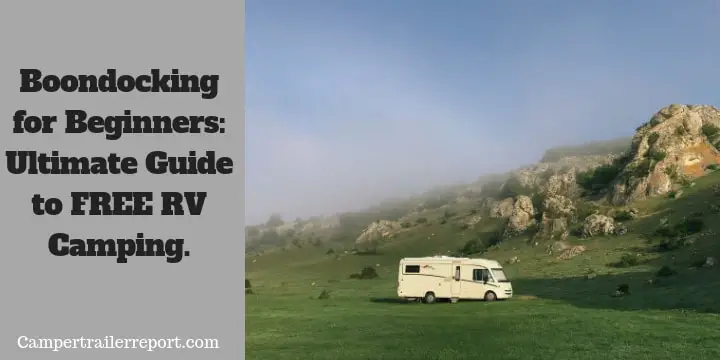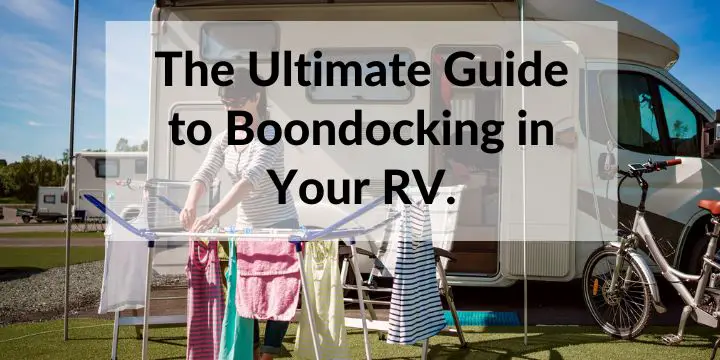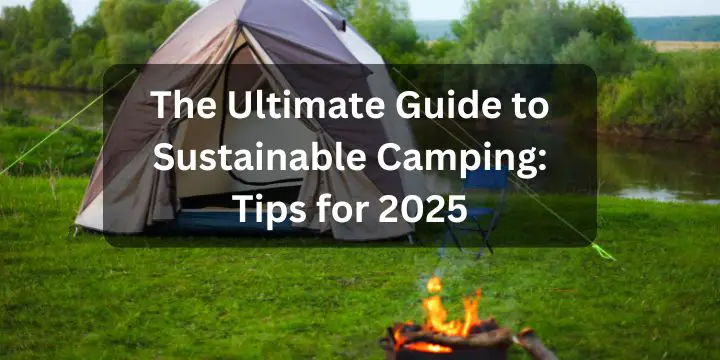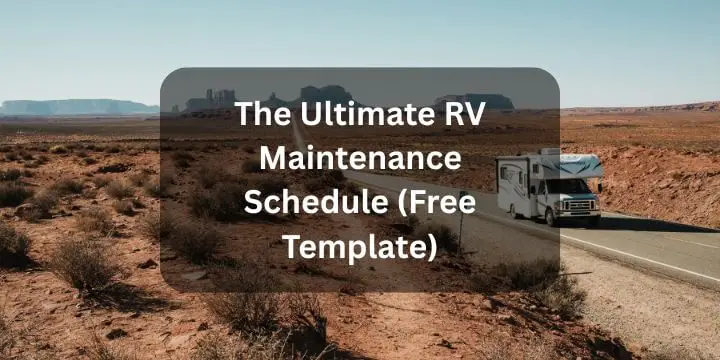Boondocking for Beginners: Ultimate Guide to FREE RV Camping.
Boondocking represents a way of exploring nature by camping using a recreational vehicle. Boondocking involves people engaging in their camping activities with limited services.
Boondocking will enable you to go camping with a manageable budget as you have limited access to amenities such as water, power and sewer services. Boondocking for beginners is not an easy experience and many questions will linger their mind on what things they will need to have an amazing experience.
Boondocking is fun when you get to understand the basic requirements.
Some of the issues that will crisscross your mind when you are new to boondocking include; how to find free spots for boondocking, how to manage with the limited amenities, how to determine the safe places to camp among other issues. You should not allow these issues to derail the whole activity.
This guide will help you to know some of the basics of boondocking for beginners and what is required.
How to find free spots for boondocking
If you are looking for free spots for your recreational vehicle (RV) parking, you can choose from alternatives that include the following; dispersed, packing lots, and stealth parking.
Stealth parking involves finding a parking space where there is no restriction by any authority. Stealth parking is suitable for vans and small Recreational Vehicles (RV).
Dispersed camping is the free camping site that is provided by the government on public land. You need to follow the regulations provided to be allowed to utilize the facilities for your camping needs.
Public lands can include national parks, forest reserves, and other designated lands.
Parking lots represent the parking space provided by large businesses such as Walmart and Cracker Barrel for their customers.
Parking lots have a time restriction and you need to contact the owners in advance to have access to the facility. They are suitable for spending a night.
Boondocking spots can be found with some research over the Internet. There exist several websites and applications with important information where you can get recommendations on the free areas for parking.
Some of these applications and websites include Ultimate Campgrounds, Compendium, All Stays and many more. Other important considerations for boondocking for beginners include the following.
> You may also like Gas vs Diesel For Towing a Fifth Wheel?<<
Water Conservation during Boondocking
Water is a very important resource when it comes to boondocking. Proper utilization of water will help you extend your camping activities. It is important to utilize efficiently the amount of water available in the holding tank as it is not guaranteed that you will find free water to refill your holding tanks. The size of the holding tanks depends on the size of the recreational vehicle (RV). A big Recreational Vehicle (RV) has large holding tanks.
You will need to identify those cleaning activities that consume large amounts of water and look for means to reduce wastage.
Some of these activities include showering and washing of dishes. You do not have to take a shower every day since water is a scarce resource during dry camping.
When you decide to take a shower, ensure you have a low flow shower head that utilizes less amount of water in a minute.
You can also utilize the plastic dishpan in the shower to hold the water from being wasted. The water conserved can be used in the washing of the dishes or flushing of the toilet.
You can also use paper products that are easily disposable to cut down on water usage. Paper products are used in the manufacture of disposable cups and plates.
The Power Requirements during Boondocking
Power is another important consideration when trying out boondocking. You need to ensure you have a reliable source of power that will keep you night lit and safe.
RV solar power is one alternative that you can utilize to guarantee your power during the camping experience.
You can choose the solar panels to be installed on top of your van or purchase the portable solar panels. You can also carry a generator to act as a backup plan for your power requirements.
> You may also like:45 RV Accessory Must-Haves for Your Travel Trailer<<
Sewage Management
RV Related Questions.
What is the difference between dry camping and Boondocking?
Boondocking and dry camping are synonyms with only a little bit of difference. Boondocking is camping without any link or connection to mains electricity and any equipment that can link you to the outside world in undeveloped camping grounds. While dry camping is referred to camping in a camping ground that still is developed.
Is RV Boondocking safe?
It is speculated that being robbed or any sort of committed crime can occur to you more in your own house than in your recreational vehicle. Crime is not common in recreational vehicles like motorhomes or teardrop trailers but since you are traveling outside in remote areas or destinations, it is only natural that you want utmost security of your camper.
What is Boondocking camping?
Boondocking camping is a term used usually by the United States of America that refers to the practice of “winging it out” across the states where you simply park at remote locations (sometimes even at highways), as long as the locations are free. Whatever form of recreational vehicle you use, one is for certain: there are limited (to even none at all) facilities.
Technically, although, a boondock means a bucolic, countryside area surrounded with dense brush. The most famous sites for boondocking are typically shopping malls parking areas, truck stops, and Wal-Mart. Those who had experienced boondocking in the past had suggested that stay only with the maximum of two nights and you must be well behaved to avoid being forced out of the premises.
Can you live in a camper on your property?
Nowadays, it is quite hard to find your way through housing marketing, and there are people out there that just did not want to bother at all. Some people consider buying recreational vehicles like motorhomes, caravans, camping-trailers or teardrop caravans and just use it on the piece of land that you either own already or at least wish to purchase.
It is essential to take caution when proceeding onto this step, as there certain cities that do not allow any full-time use of travel-trailers or RVs on property within the city’s premises. There are even cities that absolutely forbids parking their completely vacant RVs in their own garages!
There are so many things you have to consider things like:
- Options regarding the property.
- Land clearing is not expensive.
- There are no bills for sewer or water but that meant no access to water or sewer pipelines.
How much does it cost to stay in an RV park?
Experienced RV owners said that most campsites cost with the minimum of $25 and the maximum of $80—however it still depends on the location, the area’s space and size and what other connections and facilities being offered. Some had input that a camper trailer of average size and model (with water and power installed) that it would cost at least less or more than $50.
Certain popular sites would even cost as high as $120 during spring
> You may also like: How To Prepare Your Truck for Towing: 9 Important Tips<<



